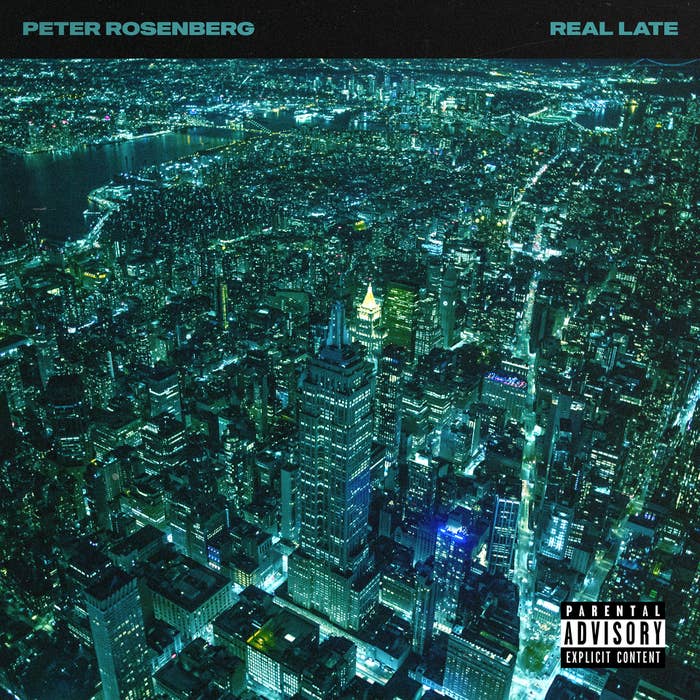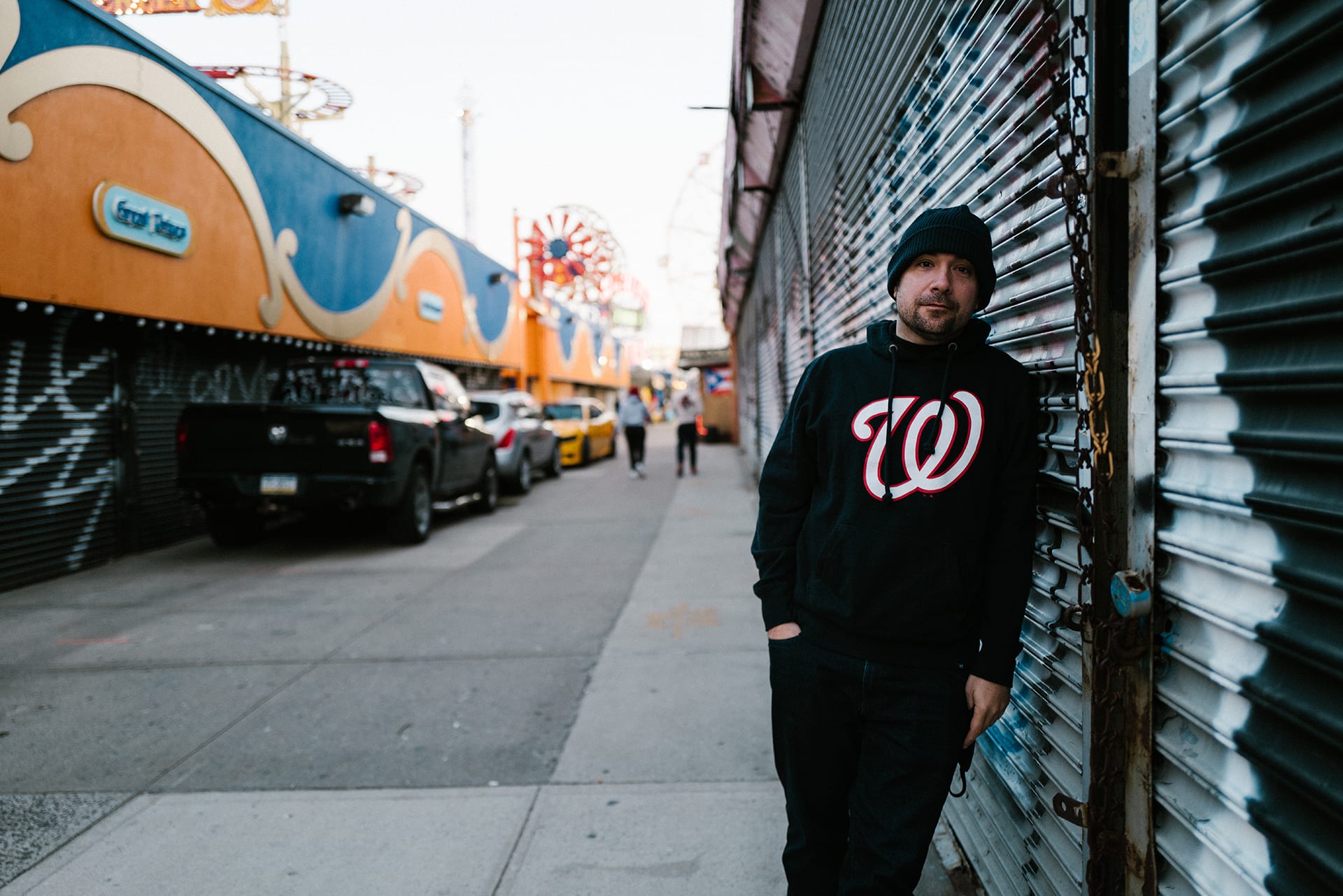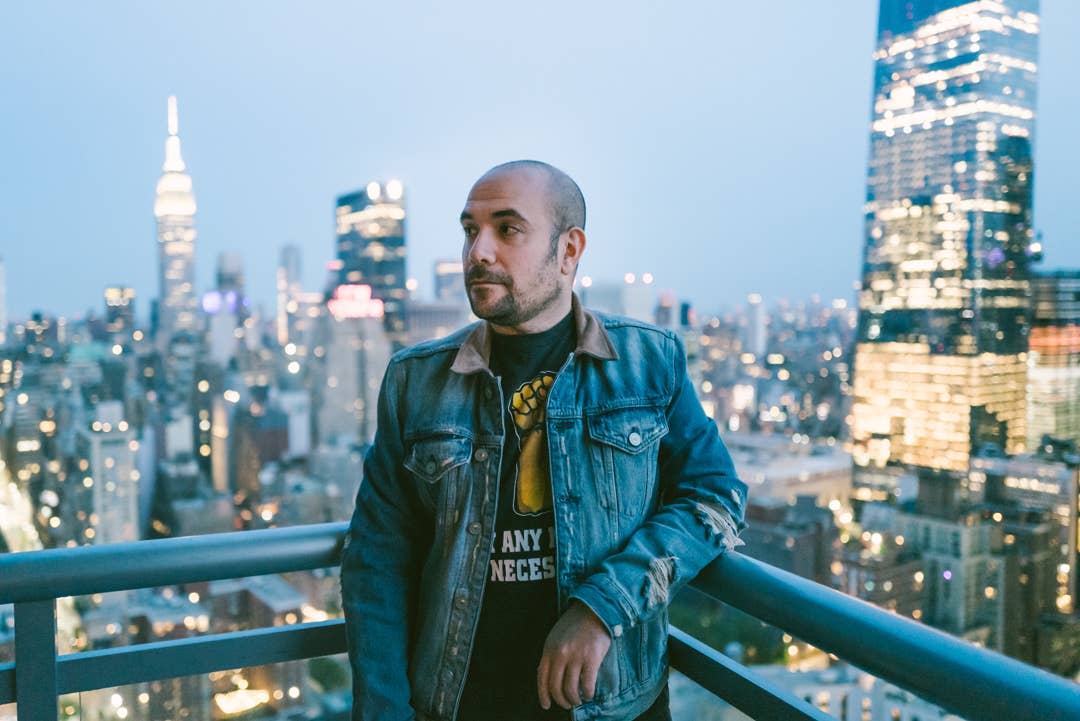
What a time to drop a dope underground hip-hop compilation. Peter Rosenberg—who can be heard talking hip-hop on Hot 97’s Ebro In the Morning and diving into the world of sports on ESPN Radio’s The Michael Kay Show—just launched his Real Late label, and he’s about to release his first album. Real Late is a compilation featuring many of your favorite MCs (including Wu-Tang Clan members Method Man, Raekwon, and Ghostface Killah, as well as Styles P, Smoke DZA, Westside Gunn, and many others) alongside some cats you may not be up on but should be rocking with (like Willie the Kid and Homeboy Sandman) and a number of ill producers, including Graymatter, Buck Dudley, DJ Skizz and many others.
The release of Real Late comes at an intriguing time in the rap game. Griselda, Freddie Gibbs, and others are showcasing that there is a viable underground hip-hop community out there, and Rosenberg—who’s been showcasing this sound and these artists ever since he touched down at Hot 97 back in 2007—is the right man to DJ Khaled a project of this magnitude. It feels like the beginning of Rosenberg’s next chapter, while also being the logical next step in what he’s been doing all along: putting people on to dope music.
During a lull in his busy morning schedule, Rosenberg hopped on Zoom to talk the genesis of Real Late, what he actually did on Real Late (which is a lot more than you may realize), his aspirations to get that Rap Album of the Year Grammy, his thoughts on the future of the Juan Ep podcast with Cipha Sounds, and dealing with life after a major breakup. [Ed note—We recommend reading through this after listening to Real Late. While these aren’t liner notes, this conversation could be the closest thing to liner notes. You’re welcome.]

How long have you been working on what became Real Late?
I guess my first idea was a few years ago, and I got really sidetracked. Then my marriage broke up, and literally the day it broke up, I got a verse back when I was totally not in a place to think about it. Six months later, when I was trying to start gaining my bearings again, I put that song together, and it turned out to be a really fire song. I was going to try to do something with it right away. For whatever reason, I just got sidetracked on it again, and kind of thought this isn’t the song for me to put out. It was a very commercial record. And don’t get me wrong, I love the record and it is nostalgic, but it’s very commercial. And I just thought it kind of feels out of nowhere.
Around that same time, my buddy Mark [Rosado], who helped me A&R this album, started sending me music. And I was like, “Yo bro, can you just send me music every week?” Because over the years, I’ve kind of gotten out of the practice of knowing how to seek out new music, and as a result I was kind of playing repetitive stuff on Real Late, and I’d lost sort of my… I was kind of just doing it. And I never wanted to just sort of “do” that show. I always wanted to really care. When Mark started sending me music on a weekly basis, I realized how many dope new artists there were. And then I started playing them and saw how excited they were to get play. And I was like, “Wait, this is an opportunity for me to really reinvigorate myself, one, and also play the music of artists who need the support and who appreciate the support.”
That started translating into, “Well, why don’t I make a compilation with these people?” Instead of me having to go chasing people and it being a huge pain in the ass, it can be a slightly reduced pain in the ass, because it’s people who at least actively want the opportunity. And so that’s what ended up eventually sort of morphing into this project, was me being reinvigorated and sort of trying to find myself post-divorce. And then also, Mark putting me onto all these artists, simultaneously Griselda is emerging. It just kind of all morphed in concert.
I wasn’t planning on bringing this up, but you mentioned your divorce. Recently on Juan Ep, you mentioned that you’ve not really discussed your divorce story publicly. I know you’re in a relationship right now, and I imagine things are going well, but are you planning on laying the story of your last relationship all out there at some point?
I don’t know. At some point I know I will. I just don’t know when that is. And listen, it’s not even like there’s some huge reveal or anything. It’s more about when I get comfortable telling it all to people so I think other people could benefit from it, but for me, it was just a huge step getting to mention it.
I don’t know how these celebrities get divorced and it’s on their social media the day it happens. That was when I realized I’m not a real celebrity. I’m a real regular person. I don’t want to share this with people. I just need to figure out how to live day to day. So for me, it makes me feel better to just even be able to say it. And one day, if I go more into it, it would be a conversation that I’d have to have with my ex-wife, with my current girlfriend, with everybody, like, “How much do you want to reveal?” But for me, just being able to talk about it and tell people that it happened and it was incredibly hard, I think that has served at least a purpose. I definitely have gotten my share of communication from people who hear it and are just happy to hear someone on the other side, because I don’t think we publicly talk about how hard that can be. It’s not a real common conversation. Yes, it’s a common conversation that people break up, but I don’t think it’s a common conversation that it absolutely floors you, and can really make it feel like it’s hard to emerge from.
That’s kind of part of what led me back to the music, because I was like, “Well, who was I? Who was I before this incredibly long, more than a decade-long relationship? Who was I?” And I was like, “Oh yeah, I’m a DJ. That’s who I am.” And so the music really was therapeutic—or just having something to lean into to find who we are deep inside, because as an adult, it’s easy to get used to it. You work in the business, all of it gets sort of normalized, and so making music really made me feel more like a kid than, say, doing my radio show does, which can often feel like a job.
That Styles P verse on “S.R.D.” is probably my favorite verse on the project. But I can imagine for you, having a Method Man verse and then Rae’s right behind it on your album is big shit. Were you in the studio with them? Or did a lot of this come together with Pro Tools and sending shit?
Yeah. I was never in the studio with one person on this project. I would say the thing that I’m most proud of is that with a couple of exceptions—the Westside Gunn song was complete and he gave me that song; and the intro with Vel the Wonder and Skizz, they had already done her verses—everything else was me. And on a couple [with] Mark, just using our heads to put together the project. What I love is that you have all these producers who don’t know the artists, and artists who don’t know the other artists, and no one is in the studio together. To me—and obviously I’m biased—it comes across as such a seamless, cohesive body of work. That’s what I hang my hat on pride-wise, because people don’t understand. “Well, what did you do?” It’s like, well, that’s what I did. I made it what it all comes together to be. And it’s really, between producers and artists, I don’t know the exact number, roughly 30 different people, with different ideas, in different places. And it kind of all came through my laptop, in my guest room, just kind of putting the whole thing together.
I saw people saying, “Oh, Rosenberg kind of did a Khaled thing,” which I think is probably the best example for people to understand it. But I kept going back to the first Lyricist Lounge compilation, because you mentioned the cohesion. Yeah, there were freestyles and there were songs, but it was supposed to be set at the club. You would go to the bathroom, and there’s a cypher going on in the bathroom. You come out and then De La Soul’s spitting a freestyle. As someone who’s been listening to Juan Ep since it began, I appreciated the random clips that were thrown in. There’s the one where the guy who got hit was like, “You hit the tip?”
I’ll send you that clip, which is one of my favorite YouTube clips of all time. And for some reason I thought it would work there. Because it ends with the studio and because he talks about the studio, it tied together to me. But that was sort of just a pop myself. I love that clip.
I know what you’re saying. And Lyricist Lounge is a good comparison, because it is really a compilation of all different people doing different things, but they put it together in such a way that you’re like… I didn’t want it to feel like a soundtrack where you’re just hearing random songs. I mean, there are some soundtracks that make sense. You listen to Juan Ep, I love Soul in the Hole. Soul in the Hole sounded like it was something. From the first song it’s about basketball. And then some songs aren’t at all, but at least musically, it goes. Some of the soundtracks that we love in hip-hop, they’re great, but when you go back, you’re like, “I skipped that, I skipped that, I skipped that. I know I’ve never listened to that one. Oh yeah, that one.” And I really wanted it to be something, because listen, I know I’m aiming for a specific audience. I know I’m not getting a hit off of this. So let me lean all the way in and do it for the people who are actually going to listen to the whole thing. This is a project for people who care enough about those artists. Either they’re interested in me, and I think much more likely and more common will be: they see enough artists that they like on it, that they go, “I’ll hit play and let the whole thing ride.” My goal was to not have them skip, and I think I succeeded in that regard if I do say so myself.
I am assuming you’re not coaching anybody, but did you pop when you heard Styles P say, “It’s the ghost of Peter Rosenberg!” on the track?
Any of the references to me on the album were all complete surprises like, so of course I pop. By the way, speaking of “S.R.D.” you’re a Juan Ep head… Did you put together the title of that song?
I had some thoughts, but I figured it would come to me at some point. But if you can enlighten me, I would appreciate it.
So that song is Styles P, Ransom, and DZA. S R D. Those were the initials of my late brother-in-law as well. For me, it was an Easter egg. I know not everyone’s going to get it. They’ll just think Styles, Ransom, DZA, and that I didn’t have a name for the song. A lot of times, you’re working off the name of the instrumental that the producer gave you. So for the first six months, that song was called “81 Crystals,” because that’s what Buck Dudley called the song. But I’m not going to call the song “81 Crystals,” even though it’s a cool name. So I’m sitting there with a blank name. And then it’s like Styles, Ransom, DZA. And I was like, “Oh, shit. Perfect.” I could pay homage to Spencer in this very kind of subtle Easter egg way, and it’s their names.
Styles sent his verse first. He was, by the way, the fastest turnaround, maybe of anyone on the entire album.
Wow. That’s awesome to hear, because he’s been doing this.
Yeah. He knows this rhythm. So he turns it around instantly. And then I gave it to DZA and Ransom. And Ransom, I assumed that he would rap after what I thought was the hook, which is when the beat changes. It goes “dan a nan na, nan, nan, nan, nanan.” And I thought about that being a chorus. I used to always even sing a little chorus to it, and I thought I might try to do it, which was a play on Nice & Smooth. I thought about the “something, something, something, something more and more hits!” Then when Ransom sends his verse back, he raps right on the back of Styles P. And he sounded so good. And I was like, “Well, fuck. I guess I’ve got to leave that in place.” Then I had to have DZA redo the beginning of his, because he needed to sound right coming in on top of Ransom.
So, that’s sort of the art inside making the album, is just how you put the things together. Because for the most part, like in the case of Ransom, he did hear Styles’ verse, but a lot of people didn’t even hear the other verses. They’re just rhyming on a beat and you’re putting it together. So, like, Raekwon didn’t know what Meth did.
What about “I Want It All”? That’s one of those tracks that’s real hypnotic. They didn’t know what was going on either?
So, you know what? That’s a record Mark A&Red. He said, “What do you think of this beat for Fly Anakin and Nickelus F?” I said, “Sounds great.” That’s another Graymatter record. I was like, “Sounds great. Go ahead. Let’s get it done.” Next thing I get back is them, and they’re both on it. I do not know how much they interacted, honestly. I have never asked them. But it was interesting because Anakin, what he did on it was basically a hook that he repeated endlessly. And it took me a while to listen to it. And I’m like, “Wait a second. There’s not really a full verse here. He just did a lot of shit on it.” And it went on for two-and-a-half minutes. And the way it was originally given to me was, him doing that endlessly, and then at the way end of it, Nickelus spits his bars.
That was actually me making that record, cutting the two parts, separating it, putting him in the middle, and it ended up sounding like that’s what it’s supposed to sound like. But that’s not what it was. And I love that, because then you get used to the song after a while and you forget that it was ever different. If you did it well, you’re like, “This is just what the song is.”
Jesus. That’s amazing.
It makes me super proud, when I listen to it, to even think that I did some of it. Because, like I said, I think it comes off like these guys all did this the way it came across. But with very few exceptions, that’s not what it was. It was something else.
That’s the Khaled in you, I guess you would say.
Yeah. And it’s frustrating to hear people be like, “What do you actually fucking do?” It just shows how little people know. People don’t even know what an A&R is. They don’t know what an executive producer does. They don’t know what Puffy did on Life After Death. They don’t understand any of it.

I was going to make a reference to Teo Macero and what he did with Miles Davis albums back in the day. But we’re talking to listeners who may not have grown up reading liner notes. If they buy the album, a lot of times it doesn’t even come with a PDF to see who produced what. Many people don’t have an understanding of what these figures do, and how they are instrumental in making them. Because a rapper will come in, spit 37 bars if they want, and then leave. And now you have to figure that out.
If you listen to “Snake Eyes,” Ghostface ends on, “They can sniff Peru!” He very clearly was going to put another line after that and never did. So, Crimeapple sends a verse, and I was like, “Ghost gave 14, so try to do 18 and come right in on the end.” And when Crime put his verse right on top of Ghost’s, their voice quality, it did not work on top of each other. Ghost is so strong that even though Crime’s verse is fucking… I love it. I just think he bodied it. The voice qualities don’t match. Crime sounds too chill with Ghostface saying, “sniff Peru!” It’s just like… So Kenny Schwartz, who mixed the album, I was like, “Can you come up with something to sort of echo out Ghostface’s verse, so by the time we get to Crimeapple, we’ve had a little bit of a breather?” And then there was a lot of back and forth about, should there be scratches there? Should there be a movie sample? And in the end, I just liked letting it die out. And then the next verse starts. To me, it ended up working, but that was a game every time. I never knew if Ghost was going to send another line, but my hunch was? Probably not.
We talk a lot about the construction of certain songs, but in general, do you have any favorites from the album? Whether it be because of the time it took to put it together, or just the end result and how hard it sounded?
I am in love with the intro. I really think Vel the Wonder is going to be a takeaway for a lot of people, especially because she’s the first voice on the whole thing.
Sets the tone.
Most people won’t know her. And Skizz, that record just feels like something the second the pianos come in. He pulled the Sean Price sample. I forgot to even think to use that. So from the very beginning, that record sounds like an intro to me. It sounds like the start of something, which is crazy because he sent it to me as, “I like Vel the Wonder.” I wanted stuff from Skizz. He’s like, “I have this.” And I’m like, “Bro, this is an intro.” [Skizz said,] “That’s what this is already. I don’t know what y’all were going to do with it.” Because when he sent it to me, it didn’t start with just the piano. It started with the drums. It started with the whole song. And I was like, “Yo, can you pull the drums at the beginning and just let the pianos play to give it a building intro kind of feel?” That’s a really rambling way of saying I love the intro. I love the Ghostface one.
I love that. That’s another song, there are a couple songs where I take artists from different generations and put them together. And that’s one of them. I thought Jones really came through. I love that he tells sort of a personal story about us on the record. “S.R.D.,” I have strong feelings about that. And I got to tell you, I absolutely love the Homeboy Sandman record.
It hits a little too real!
Yo, bro. So I had a friend who I trust a lot, and that song was in the middle of the album. And he was like, “Bro, I love the song, but I don’t think it fits in context with everything.” So then I decided I was going to make it a bonus cut because I thought he was right. I’m like, “You know what? Sonically, it’s a bonus.” And then in the end I just made it the last song and got rid of the bonus, because I know when things are bonus, people treat it differently. And I didn’t want it to be thought of as different, because it could be the best song on the album. But I understand that it doesn’t fit sonically the same way. But he’s always great. That’s one of those songs where it reminds me—and I know this is a weird comparison—but it reminds me of a Kanye song where there is no chorus, but he says these things that are so memorable that you start singing along to those parts. Like, they’re a chorus when you hear the song back, you know?
Sand’s good. He can flow, because he can harmonize and get a little melodic with things. It’s almost like a Mos Def quality that he has at times.
Yes. He’s a guy who keeps getting better and better. I don’t think he’s hit his ceiling yet. And I know a lot of people. One thing that I’m finding with the promotion of this album is how many people put this kind of hip-hop in a box. It’s cool. It’s nice that you’re doing that. It’s cute. It’s cute. As if it’s not awesomely, iconic music that’s being made. And I think people like Sandman get put in that box. Like, “he’s good. He’s good for an underground rapper.” It’s like, Homeboy Sandman is one of the best rappers on planet Earth, and he has been for 15 years. And honestly, he’s only getting better. What makes Sandman so incredible is that he’s so complex as a rapper. And on that song, while he’s saying the realest shit, it’s very digestible.
I’m now a fan of Buck Dudley off of this record. And I think being able to search for more Sandman material, maybe that’s a spark that makes them become a fan.
And then they look and they see how much he has. And the same with Graymatter. Graymatter’s produced a lot of shit for notable people, but you hope that when they see him on a Method Man and Raekwon song… That’s why I think the artists were really excited to do it, because they were sending me beats, not knowing who they were going to end up with. They were able to score features with people that they wouldn’t have otherwise. And that, to me, was the gem of it, getting those producers with those artists. Everyone was sort of giving the rub to someone else. Everyone gets helped by everyone on the project, honestly.
So you’ve got the Real Late album. You’ve started Real Late Records?
Yeah. That’s sort of the umbrella of everything I’m doing. And I don’t know what that means. I haven’t decided. I don’t have plans of putting out other people’s projects. I’m not saying I won’t, but my initial goal is [to] get a few of these done. I’m already in the early stages on the next one. I’m just trying to build a catalog where algorithmically, all the stuff feeds to each other. So if you like all of these people, and if I have 100 songs on streaming services, it’s sort of a network of that kind of music that can do its own thing.
I’m down to put out other projects. I just want to be able to really help people. Until my brand means something, in terms of music being released, what am I really giving to the person? Because I’m not going to have budgets to pay for PR campaigns for every project. Maybe down the line, I will. I’ll see that vision, but at this point I’m yet to really make any money off music in this way. So to see what that can do would then maybe allow me to do more. I just don’t want people to have expectations that I’m not able to deliver on. Whereas with this, it’s very easy. Willie the Kid sends me a verse, he gets to be on a song with Rae and Meth, and he gets to get played on the radio. Everyone gets a win. It’s very easy. It becomes more complicated when they have expectations for what you can do for their project.

